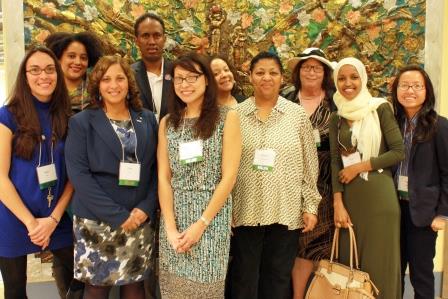Nexus is proud to acknowledge and commend the work of our former intern, Ashley James, on her excellent work in the Alameda County Assets Network in Oakland, California! After graduating from the Humphrey Institute of Public Affairs, Ashley completed her internship with Nexus Community Partners and the Metropolitan Council of the Twin Cities in the
Year: 2013
Poverty in the Twin Cities: The stories we tell ourselves matter
By Neeraj Mehta and Nelima Sitati For some, the dominant storyline in the Twin Cities is that we are a vibrant and healthy place. We frequently make “top 10” lists of places to live because of our numerous social and economic assets. We are highly educated, mostly healthy and home to dozens of Fortune 100
Dec 2013: The Cooperative Model
Community Wealth Building: The Cooperative Model Click here to read more about the December Thursday Night Issue Series, and click on the below links to hear the audio recordings of each of our fierce panelists! View the photo gallery here. LaDonna Redmond Nieeta Presley Pakou Hang Yolanda Cotterall
“Why just workers? Why not owners?” Cooperatives as a Wealth-Building Tool in Communities of Color
“Why just workers? Why not owners?” On Thursday, December 5th, 2013, over 40 community members braved the bitter Minnesota cold in order to share their reflections on why the cooperative model is important in communities of color as an asset/wealth building tool in the Twin Cities. This Issue Series gathered a panel of four, fierce
How are Cooperatives Building Wealth in Communities of Color? Join Us This Thursday to Find Out!
The Boards and Commissions Leadership Institute (BCLI) fellows began training in October, and are well on their way to becoming placed on city boards and commissions in the Twin Cities (four are already seated). The fellows will work to ensure that the rights of people of color and underrepresented communities are honored through policies made at the
Nov 2013: Social Capital and Opportunity
Capitalizing on the Collective Network: Social Capital and Opportunity Structures Check out this video of Amaha Sellassie on social capital from November’s event: Part 1 of 2: Leadership in the Twin Cities: Our Networks. Our Future. Capitalizing on the Collective Network. This event was part of our Thursday Night Issue Series partnership with NLP Link-Up – click here for more information
The Community Discusses a Juvenile Reception Center on the East Side
As promised we are sharing an update from the community discussion of a potential Juvenile “Reception Center” on the East Side of Saint Paul. All attendees of the October 16, 2013 should receive invitations via email to upcoming community discussions of this proposal. We will share any updates or invites as we learn more. Juvenile
Twin Cities – We Have Lift-Off! Nexus Launches Inaugural Boards and Commissions Leadership Institute

Nexus Community Partners officially launched its inaugural Boards and Commissions Leadership Institute (BCLI) on Thursday, October 10th, 2013! Over 40 community members joined us at the Wellstone Center in St. Paul for this celebratory and inspiring event as we introduced the first twelve fellows to the community. Click here to meet the fellows. Already they
Community Engagement Team 3rd Round Funding
Nexus Community Partners, and the Community Engagement Team (CET) of the Corridors of Opportunity are pleased to announce the availability of a 3rd round of CET funding. Attached please find the guidelines and application for the Capacity grants. Applications are due on Friday, November 29th at 4:00 PM. We will be hosting an informational session at Nexus
Minneapolis American Indian Mayoral Forum
This afternoon, Danielle Mkali of Nexus had the opportunity to listen to Jay Bad Heart Bull, Daniel Yang and Sasha Houston-Brown of the Native American Community Development Institute explain their upcoming Mayoral forum on Thursday, October 17th and their voter engagement efforts. Why does Minneapolis need and American Indian Mayoral Forum? Over the past two
It’s not just having a seat at the table, it’s having a vote.
“Here’s a challenge: Get people who traditionally lack power — the poor, immigrants, people of color, the disabled — into positions of power. That’s the goal of Nexus Community Partners, a St. Paul-based nonprofit aiming to bring diverse voices with different perspectives to the tables of power around the Twin Cities. “ Read more about
BCLI Launch Event
When: Thursday, October 10, 2013, 5:30–8pm
Where: Wellstone Center, 179 Robie Street East, Saint Paul, MN 55107